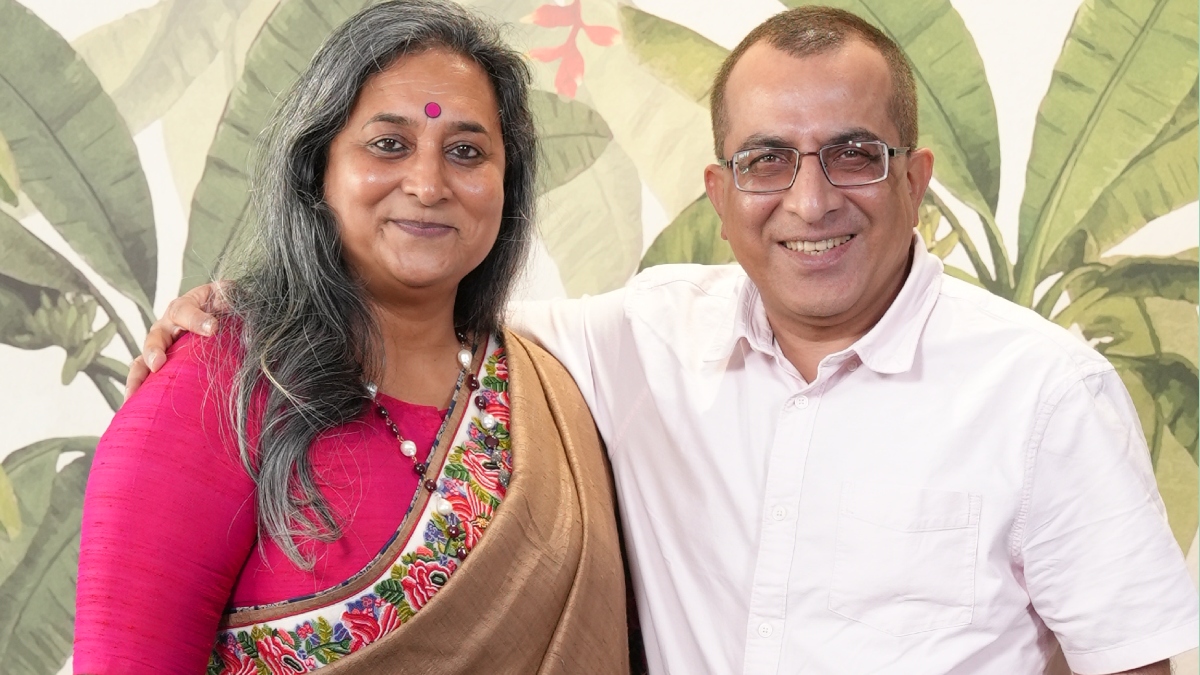Money talk in India had long been seen as taboo – but finance expert Roopa Venkatkrishnan revealed in a sparkling, advice-filled conversation with veteran anchor Vivek Law on the “Simple Hai!” podcast that breaking the silence was the first step to real prosperity.
New Delhi:
In an episode of the “Simple Hai!” podcast, money myths, emotional pitfalls, and practical strategies for investing took center stage as finance veteran Roopa Venkatkrishnan – Director of Sapient Wealth Advisor & Brokers and Director of Foundation of Independent Financial Associates (FIFA) – joined anchor Vivek Law for an incisive conversation that reframed how Indian families could talk about and build wealth. Their discussion, marked by candor and common sense, put the spotlight on why breaking silence and changing mindsets around money was emerging as India’s next big reform.
The podcast addressed the persistent challenge of poverty in India, emphasizing that the solution lay not in luck or windfalls, but in changing financial habits and mindsets. Venkatkrishnan explained that for generations, families kept money discussions private. By making financial planning an open household topic, the journey toward prosperity became attainable for millions.
The Real Barrier: Busting Fear and Taboos
Venkatkrishnan pointed out that most Indians hesitated to invest not because of inadequate means, but because of the emotional baggage attached to money – fears of failure and loss, magnified by social pressure and a culture that shamed risk-taking. “Fear is the real reason Indians don’t invest,” she emphasized. According to the show, ending the silence and encouraging open dialogues was the first step to unlocking both personal and collective growth.
Small Steps, Big Outcomes: How ₹1,000 Changed Futures
One segment of the podcast reframed investing as an accessible possibility for all. Venkatkrishnan stressed that substantial wealth could be built with discipline and modest contributions: “You only need ₹ 500 per month / ₹1,000 per month to change your future.” With consistent investment habits, even small amounts compounded over time could help families escape poverty within a decade.
Why Advisors Mattered and Myths Didn’t
Another barrier uncovered in the podcast was India’s shrinking pool of qualified investment advisors and Mutual Fund Distributors. Seasoned voices like Venkatkrishnan and Law stressed the importance of trustworthy guidance – especially for first-time investors. Listeners were warned not to believe investment myths: timing the market, chasing the hottest stocks, or waiting for windfalls wasn’t necessary. Beginning with mutual funds or SIPs, knowing one’s risk appetite, and prioritizing regularity over prediction were positioned as the best practices.
Expecting Every Fund to Underperform – and Why That Was Okay
Venkatkrishnan emphasized a crucial truth that often spooks novice investors: “Every fund will underperform at some point – usually within a 3-year window.” Instead of panicking or chasing the next big winner, she advised viewers to understand that cycles and setbacks were part of the investment journey. The lesson remained simple but powerful: successful investors looked beyond short-term fluctuations, focused on long-term goals, and resisted the urge to constantly switch strategies.
Money and Emotions: Managing the Push-and-Pull
A standout section in the podcast delved into the emotional push-and-pull of personal finance. “Money evokes emotions,” Venkatkrishnan explained. From fear and anxiety to overconfidence in bull runs, these feelings could cloud judgment and leave families paralyzed or impulsive. The key lay in building awareness for not just returns, but one’s relationship to money and risk. Open, honest dialogues at home, inspired by conversations like those in “Simple Hai!”, helped families understand and manage their emotional triggers.
Why Mutual Funds Worked: Simplicity and Power for All
Later in the conversation, Venkatkrishnan and Law debunked the myth that mutual funds were complex or reserved for the financially savvy. “Mutual funds are the most democratic investment machinery available,” they affirmed. With automation, diversification and professional management, mutual funds empowered ordinary Indians to start investing with confidence and minimal effort. The session broke down intimidating jargon and reframed mutual funds as a smart, accessible tool for all.
The Simple Roadmap
As Venkatkrishnan told Law, “Every person needs a guide to handhold them through the journey of wealth creation. Just as the best athletes continue to work with a coach till their last day of retirement — to stay focused, disciplined, and motivated — investors too need a trusted financial coach who helps them stay aligned with their goals through every market cycle. Even for something as joyful as a wedding sangeet, we turn to a dance master to guide our steps and bring rhythm to our movements. Likewise, in the dance of money and emotions, having a mentor ensures that every step leads you closer to your dreams — with balance, grace, and purpose.”
The podcast then outlined practical steps for listeners:
Start a conversation about money at home – demystify, don’t dramatize.
Begin with what is available, not with aspirations; even ₹ 500 / ₹1,000 count.
Seek credible advice, preferably through a registered advisor.
Automate discipline: set up a SIP, however small, and stick with it.
Teach kids and elders alike the basics – empower everyone.
Stay consistent, be patient. Let compounding work quietly in your favor.
Making Wealth India’s New Normal
In summary, the “Simple Hai!” conversation between Roopa Venkatkrishnan and Vivek Law concluded that India’s journey to financial freedom was rooted in honest discussions, patient discipline, and shifting cultural taboos. As Venkatkrishnan summarised it, “”Financial discipline and honest conversations are what actually build wealth – no matter your starting point, start small and be consistent.”
Their insights called for smart habits and consistent action – making wealth not an exception, but the new norm for Indian households.
(Disclaimer: This is sponsored content. The liability for the article solely rests with the provider. The content has not been verified by India TV channel and IndiaTVNews.com)

